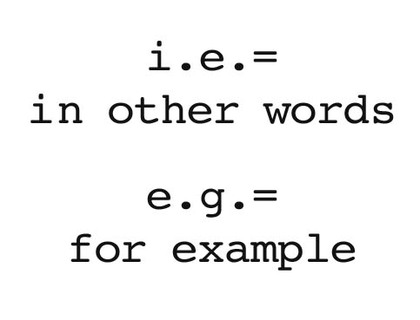The abbreviations i.e. and e.g. are frequently misused and misunderstood. Here's an explanation of what they mean and a memory aid to help you use them correctly.
I.E.
I.e. is an abbreviation for the Latin phrase id est, which translated means that is. My easy memory tool is to equate "that is" with "in other words." I associate the "i" of i.e. with "in," to help me remember its meaning. If you can substitute "that is" or "in other words" for i.e. in your sentence, then you've made the right choice.
Examples
I will spend the weekend engaged in my favorite activity, i.e., reading a book.
I will spend the weekend engaged in my favorite activity, that is, reading a book.
I will spend the weekend engaged in my favorite activity, in other words, reading a book.
E.G.
The abbreviation e.g. is Latin for exempli gratia, which means "for example" or "example given." My memory aid is to remember the "e" for example. In fact, I even think of it as eggs-ample, further playing on the "eg" letters.
Examples
Mary likes to grow salad fixings in her garden, e.g., spinach, lettuce, radishes and tomatoes.
Mary likes to grow salad fixings in her garden, for example, spinach, lettuce, radishes and tomatoes.
If you can remember "i" for "in" and "e" for "example," you should be able to easily distinguish between this pair of word teasers. In fact, if you can just remember one, you know the other by default.
For American English users, remember that i.e. and e.g. are set off with commas. It is also acceptable to precede these abbreviations with a semicolon instead of a comma.
Have you had issues distinguishing between i.e. and e.g.? Do you have a memory aid to help you remember the difference? Please share your thoughts in the comments. And if you have a grammar question, please share it here.
I.E.
I.e. is an abbreviation for the Latin phrase id est, which translated means that is. My easy memory tool is to equate "that is" with "in other words." I associate the "i" of i.e. with "in," to help me remember its meaning. If you can substitute "that is" or "in other words" for i.e. in your sentence, then you've made the right choice.
Examples
I will spend the weekend engaged in my favorite activity, i.e., reading a book.
I will spend the weekend engaged in my favorite activity, that is, reading a book.
I will spend the weekend engaged in my favorite activity, in other words, reading a book.
E.G.
The abbreviation e.g. is Latin for exempli gratia, which means "for example" or "example given." My memory aid is to remember the "e" for example. In fact, I even think of it as eggs-ample, further playing on the "eg" letters.
Examples
Mary likes to grow salad fixings in her garden, e.g., spinach, lettuce, radishes and tomatoes.
Mary likes to grow salad fixings in her garden, for example, spinach, lettuce, radishes and tomatoes.
If you can remember "i" for "in" and "e" for "example," you should be able to easily distinguish between this pair of word teasers. In fact, if you can just remember one, you know the other by default.
For American English users, remember that i.e. and e.g. are set off with commas. It is also acceptable to precede these abbreviations with a semicolon instead of a comma.
Have you had issues distinguishing between i.e. and e.g.? Do you have a memory aid to help you remember the difference? Please share your thoughts in the comments. And if you have a grammar question, please share it here.


